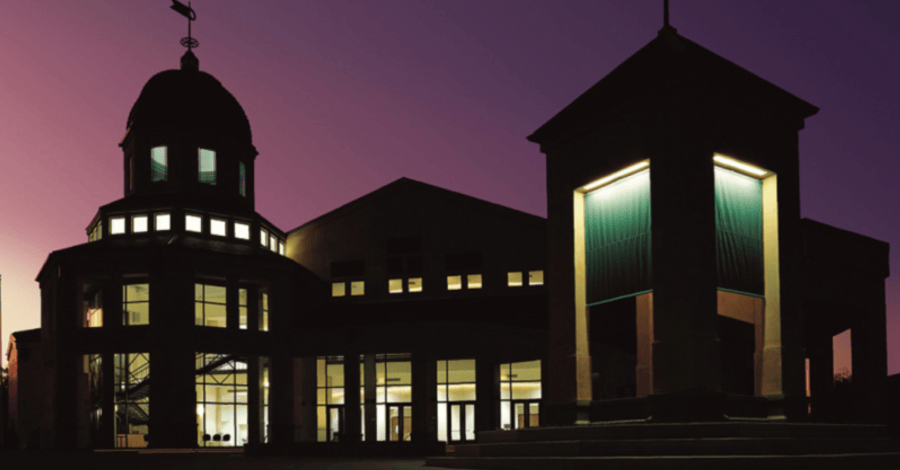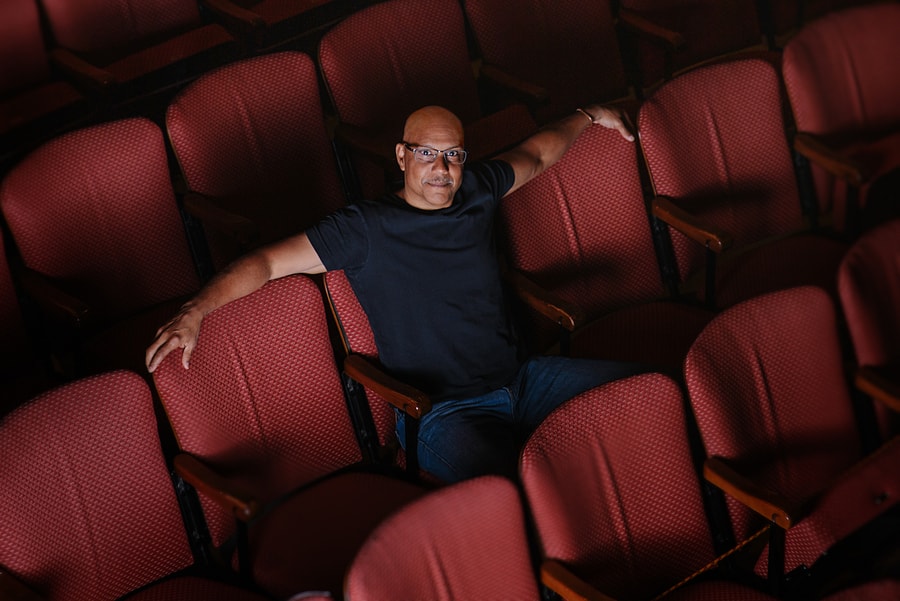Tim Bond’s new position at the helm of TheatreWorks Silicon Valley could easily be seen as daunting. Bond, whose hiring was announced in November 2019, is taking over the company on the heels of a 50th anniversary season cut short by a global crisis, amid mounting pressure on theatre leaders as part of a swelling anti-racism movement in the industry.
And that doesn’t even take into account the pressure of succeeding founding artistic director Robert Kelley, who retired at the end of June after leading the company to a 2019 Regional Theatre Tony. Kelley, in a letter to TheatreWorks patrons, praised the addition of Bond to the company, calling Bond “a man of vision and values” who, from the moment they met, “seemed like an old friend, an open-hearted partner in art, a man who viewed theatre as a collaboration among equals, among friends.”
A director with 35 years of experience, Bond is well aware of the pressure as well as the opportunities that come with this appointment. But with 11 seasons with Oregon Shakespeare Festival as associate artistic director and nine years at Syracuse Stage as producing artistic director under his belt, he has nothing to prove. We spoke recently about expectations, uncertainty, and what he’s looking forward to in this new stage of his career, as he steps away from his tenure as the head of the professional actor training program at University of Washington’s School of Drama to lead TheatreWorks through this unprecedented time.
JERALD RAYMOND PIERCE: What excites you about being able to lead a company like TheatreWorks?
TIM BOND: It’s a company with a 50-year history that has just won the Tony Award last year, and has a great audience base and a terrific staff. I’m excited about where we can go from here. Of course, you know, it’s a tricky time at the moment. But I know once things come back and are normalized hopefully again, we’ll be able to make some major progress going forward and build on the amazing legacy that’s been here. I love the new-works aspect to TheatreWorks and the possibility of commissioning and developing new plays and musicals that will seed the field and make for exciting interactions with our community here in the Bay area.
After working at University of Washington as well as at Syracuse Stage (and Syracuse University’s Department of Drama), is this move removing you entirely from the academic side of theatre, or are you still hoping to be able to participate in the education side of theatre?
Well, you know, when I was in Syracuse, we really were a standalone LORT theatre with the benefit of a relationship with a drama department, and I headed both. So that was a big load and an exciting situation. This is exciting because it feels like I’m really going to be spending more time in the community getting to know the different communities in the Bay Area and having different peer institutions in the region to interact with as well. So I’m really excited about that. There are some great theatre artists in the Bay Area and a diverse community to reach into to bring here to TheatreWorks. So I’m pumped about that.
What are some of the things you pitched to TheatreWorks’ board that you’re hoping to execute?
The diversifying of our audience base to reach younger and more culturally diverse audiences is something I’m very interested in—having initiatives and planting the seeds for now and hoping to reap those benefits in a couple of years. Continuing to expand our ability to have co-productions and collaborations with other theatres nationally is something that I’m very much looking forward to. And I’m looking at some things within the education programs that would expand and reconfigure and the way we look at education outreach and community engagement.
Do you feel any added pressure taking over from Robert Kelley, the founding artistic director of the company?
Oh, absolutely. There always is following the founder. Having Robert Kelley, who is so beloved here, and his 50-year legacy—which has to be one of the longest-running artistic directorships in the history of the American theatre—is incredibly daunting, but also very exciting, because Kelley is such an incredibly generous person. The people he’s found to bring around this company—the board, donors, audience members, and staff—also have that generosity of spirit. I’ve felt very welcomed here already.
They’ve never had another vision, another aesthetic, another voice at the helm here. It will take some time for that transition to happen. But I feel that because Kelley is still going to be here in the community, and available as a resource and as a working artist and as an emeritus artistic director, that we have already formed a great partnership that will make this a really fruitful and exciting transition once we get past this this current crisis. It’s a daunting task, but it’s one that I feel very good about.
We’ve alluded to it a few times, but can you talk more about the challenges of taking over a company in the middle of a global pandemic?
The best-laid plans, you know? The great thing that we have here is stability as a company and a strong audience base. They have been very generous, both in their donations and then their support, saying, “We’re going to hang with you through this.” The job for me is about stability and stewardship of TheatreWorks for the next couple of seasons so that we can be in a strong position to move forward when things resettle into whatever they resettle into.

There’s both a need to be very conservative and safety-oriented while still seeing what innovations we can find in terms of adaptability, being nimble, and being ready for whatever new changes come. I’m leaning into that and saying, Okay, well, what more can we learn from this about our audience, about our community, about our art form? How can we build on what we had already planned in a different way going forward? I’m trying to stay positive and keep my eye on the prize, but it’s tricky, there’s no question about it. It’s certainly put a damper on certain initiatives I hoped to really gain ground on this year. But I’m planting those seeds anyway and just expecting them to come up later in seasons down the line.
And I have to imagine this affects the initial budget you were hoping to be able to work with in that first year. Can you tell me more about trying to readjust your plans for early on in your tenure?
There’s been a lot of strategic maneuvering of our season planning and resource expectations. And we know that they will probably change again. It’s just sort of hanging on the next breath, waiting to see what new comes down the pike and how we can make adjustments to those things. I think there will be some new models of how TheatreWorks has looked at their seasons. There may be different ways we approach our subscriber packaging.
We’re just making ourselves as ready as we can be for what may come. It’s sort of like in Star Trek when they’re playing three-dimensional chess. You’re moving pieces and you’re having to think several moves ahead, times three. I think the fact that I’ve had a chance to run not only Syracuse Stage, but I spent all the years I did at Oregon Shakespeare Festival helping to construct those seasons with 70 to 90 actors and five different shows and configuring their understudy assignments and figuring all those things out—it built certain muscles around juggling five different things at once, and then they throw in a cat, you know.
I love when they throw in a cat. How do you think your responsibilities as an artistic director have shifted as a result of the recent anti-racism movement in theatre, including We See You White American Theater?
I view the current international movement for a racially equitable society and the national call for the transformation of historically white theatre institutions as a seminal opportunity for the future of the American theatre. I believe a door has been opened to a more inclusive, anti-racist organizational structure and culture. My new post has cast me in the role of a scout, leading our staff, board, and audience through that door and towards a richer and more diverse future. The decades I have spent in leadership as a BIPOC artist, teacher, and administrator have prepared me for this opportunity and I welcome it with open arms. I am committed to creating opportunities for empowering Black voices and other underrepresented artists, artisans, and administrators who have suffered marginalization.
I am also finding myself, in this time of reckoning, bearing the responsibility of guiding the white folks I work with through their sense of fairness, their confusion, and their fears, as we all begin to navigate the unfamiliar yet fertile new territory on the other side of the door. Through vital engagement with the diverse communities with whom we coexist and by creating the intersectional space for truly equitable and inclusive theatre, I trust we will all come to embrace the benefits of a richer telling of the human story.
Is there anything else you’d like the readers to know as you enter into this new era?
Just that theatre has been around a long time and has gone through many, many other crises. And the basic human need to gather and experience this work and tell these stories and share and grow from them in that communal way, it’s not going away. And when it comes back, we’re going to be ready. We’re going to be there for you. I hope that from this we will build a greater appreciation for the live theatre experience among audience members that have been coming, but also some that may not have and who are realizing they’re missing that social interaction. So I’m trying to make lemonade from the lemons. I’m excited to be here in the Bay Area with a great group of staff members and artists and other theatres. We’re all in this together.


